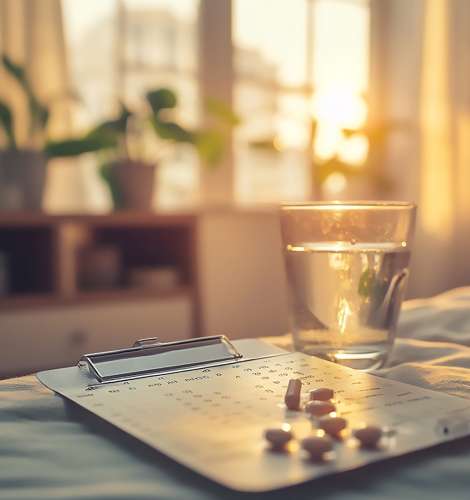Our body’s cycle of daily rhythms (circadian clock) influence responses to medications and medical procedures, from asthma to epileptic seizures, from wound healing to surgery recovery and bone repair.
Research suggests that many of today’s most common drugs, including anti-inflammatories and painkillers, heartburn, high blood pressure and erectile dysfunction medicines, can work better when taken at specific times of the day.
Sometimes timing seems to be more important than the dose.
Recent studies also showed that our body's circadian rhythm is crucial in surgery recovery and bone repair. In a study, scientists found that over 500 circadian related genes are expressed in the healing process after bone fracture and surgery.
Timing to administer anti-inflammatories and painkillers after surgery can also impact how well the surgery site or the fractured bone heals.
Morning medication for pain at night?
In another recent study, researchers analyzed the distribution of 12 drugs to almost 1,500 hospital inpatients. They found that nearly a third of all the medicines were ordered (and likely given) in a narrow time slot between 8 am and noon.
The delivery pattern is likely based on hospital staff shift patterns, with a typical shift change at 7 am, rather than the patients' clinical needs.
Some of the medicines examined are known to work better in the evening, such as hydralazine, which is given for high blood pressure. Similarly, morphine is usually distributed in the morning even though patients often report that their pain is worse at night.
The researchers suggested that the hospitals are likely undertreating pain in the evening and may be over-treating it in the morning.
After surgery – what time is best to take painkillers?
Postoperative pain management is crucial for full recovery from surgery.
Due to the potential development of dependency with opioids and the ineffectiveness of acetaminophen (common painkiller) for severe pain, non-steroidal anti-inflammatory drugs (NSAIDs) are heavily used to alleviate pain after surgery.
However, NSAIDs are known to inhibit the healing of connective tissues after surgery by inhibiting prostaglandin signaling.
Pain intensity, inflammatory mediators associated with wound healing, and the pharmacological actions of NSAIDs – they all vary throughout the day, corresponding to our biological clock rhythms, which are regulated by circadian rhythm related genes.
Studies found that connective tissue formation, and most of the wound healing mediator activities occur during the resting phase. While pain, inflammation and tissue resorption occur during the active period of the day.
Different clinical studies therefore suggest that careful selection of the time of administration can improve the effectiveness of NSAIDs and also markedly reduce their undesirable side effects.
NSAIDs exert a strong anti-inflammatory effect when ingested or injected in the morning or early afternoon, but not in the evening. Whereas the risks of adverse side effects such as indigestion, stomach ulcers, and acute kidney problems increase when NSAIDs are administered at night.
For those who have just gone through knee, shoulder or hip surgery, taking anti-inflammatories in the morning or at noon, but not at night, would be more beneficial.
Circadian rhythms affect surgery recovery
A recent Canadian study shows, for the first time, that circadian clock genes are involved in healing from surgery.
The researchers demonstrated that anti-inflammatory medications are most effective in promoting post-operative healing and recovery when taken during the active periods of our biological clocks.
The study also suggests that if anti-inflammatories are taken either later in the afternoon or at night, during the resting phases of the circadian rhythm, they can severely deter healing and bone repair following surgery.
Circadian rhythms impact bone repair
Inflammation following surgery is crucial to the healing process, since it destroys any bacteria that may be in the area and sends signals to attract tissue-rebuilding cells to the wound site.
But the inflammation process must be orchestrated and timed properly. There are periods of time when the inflammation is destructive, and there are periods when it is constructive for rebuilding tissues or bones.
The destructive component relating to bone healing occurs during the day, when cells known as osteoclasts break down bones. While the constructive cells, osteoblasts, are active at night when they rebuild bones.
Using anti-inflammatories in the mornings and painkillers at night can result in better bone healing.
Timing for healing fractured bones
In a Canadian study, researchers compared pain and bone healing in two different groups of mice with fractured tibia.
One group was given constant doses of anti-inflammatories over a twenty-four-hour period, while the others were given anti-inflammatories only in the morning - during the active phases of the circadian rhythm - and painkillers at night.
The researchers found that the second group recovered from the pain of the injury, and regained bone strength quicker and more fully. Surprisingly, they also noticed differences between the groups in the expression of over 500 genes specifically related to the bone healing processes.
The better postoperative healing and bone healing in this research is likely due to the impact of the timing of NSAIDs on inflammation, and through the overexpression of circadian clock genes at the wound site.
The effect of NSAIDs timing seems to be independent of the time of surgery.
The notion of timing drug treatments for maximum effect (chronotherapy) is gaining acceptance. It may offer an important avenue for honing and even improving many therapies. But it is not a panacea and is not applicable for all medications or ailments.

